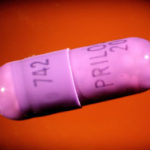Is Prilosec Causing Kidney Cancer?
Almost all medications have potential side effects. However in general, the benefits should outweigh the risks. How about prilosec (generic name; omeprazole)? There are also some side effects associated with this proton pump inhibitor. A challenging question, is it causing kidney cancer?
Your kidneys, located just underneath the ribcage on either side of your body, are responsible to filter out wastes from the circulation (bloodstream), in addition to making urine. Cancer can occur anywhere in the body, including in the kidney.
Kidney cancer is one of the 10 most common cancers in some countries. The good news, it can be treated or even may be curable if caught early. The prognosis and life expectancy of people with this cancer are also quite awesome (see more in here).
The exact cause of the disease is not known. Experts only know that the cancer occurs when cells of the kidney get altered and behave abnormally. However, some risk factors of kidney cancer have been confirmed. Risk factors are things or conditions that increase the risk of developing of the disease.
Smoking
Chewing tobacco is a significant risk factor for a number of different cancers, including kidney cancer. The more you smoke and the longer you’ve smoked – the greater the risk!
For example, regularly smoking 10 cigarettes per day may increase the risk by about one-and-a-half times if compared to non-smokers. And if you spend 20 cigarettes per day, your risk is about twice as likely to develop kidney cancer. Unfortunately, the answer of how smoking can significantly increase the risk is not known.
Obesity
Another thing to blame is obesity. According to many studies, there is a strong link between obesity and several types of cancer (including kidney cancer). For example, a review in the UK showed that about 25 percent of all kidney cancers are associated with being obese or overweight (22 percent in women and 25 percent in men).
A BMI (body mass index) of 25 or higher has been shown to raise the risk of developing this cancer. This is particularly true for people with BMI higher than 30.
How does obesity increases the risk? The increased more extra pounds of weight may trigger particular hormones in the body to stimulate the growth of cancer cells.
Other risk factors
- Older age. Many times this cancer is diagnosed in older adults, though it can also affect young adults. But in general, the risk rises with age.
- Other problems affecting the kidneys, such as renal hypertension and chronic kidney failure – especially if you need to take long-term kidney dialysis to cope with.
- Particular inherited disorders such as tuberous sclerosis, von Hippel-Lindau disease, and Birt-Hogg-Dube syndrome.
It’s also thought that the long-term use of certain medications may make the kidney work harder and eventually contribute to cause kidney cancer.
For instance, some NSAIDs (painkillers) such as ibuprofen may slightly affect the risk – although low doses or occasional use of this painkiller is likely to be safe for most people. How about with prilosec?
 It is a kind of a proton pump inhibitor (PPI) to help lower and restore the amount of acid in the stomach. With this function, it is used to help treat a number of different conditions and symptoms, especially problems associated with excess acid produced in the stomach – these include:
It is a kind of a proton pump inhibitor (PPI) to help lower and restore the amount of acid in the stomach. With this function, it is used to help treat a number of different conditions and symptoms, especially problems associated with excess acid produced in the stomach – these include:
- Gastroesophageal reflux disease (GERD) or heartburn, burning sensation in the lower chest caused by the stomach acid that goes up into the esophagus. Prilosec doesn’t relieve heartburn immediately. Since heart attack symptoms are often confused with heartburn, it’s much better to consult first with your doctor.
- Persistent cough, especially true if the excess stomach acid is the underlying cause.
- Difficulty or trouble in swallowing.
- Erosive esophagitis (damage to esophagus due to excess stomach acid).
It may also help heal acid damage to the stomach and prevent stomach ulcer. If stomach ulcer is caused by infection such as H-pylori infection, prilosec can be prescribed with antibiotics.
A new research published in JAMA internal Medicine suggests that prilosec and other proton pump inhibitors may contribute to cause long-term kidney damage. Dr. Morgan Grams, a lead author of the research said that the use of these medicines might cause about 20-50 percent greater risk of chronic kidney disease.
The research doesn’t specify a direct ‘cause & effect’ the link between these medicines and chronic kidney disease. However, experts believe that the higher doses mean the higher the risk. There was an increasing risk linked to an increasing dose, said Grams.
It seems that these medicines are not too good for the long-term health of the kidneys. How about with the risk of kidney cancer?




My husband had a one time urine in blood issue No infection. Catscan revealed cancer in kidney. Advised to have it removed. How is it removed?
Hi i have been on Prilosec/omeprazole for many years now. I have recently been told that i have some spots on my kidneys. Could this be because of what i take?